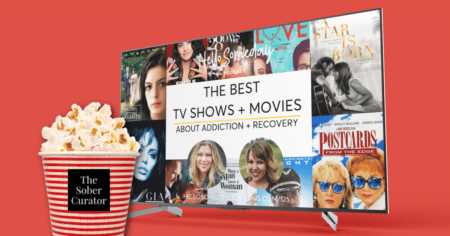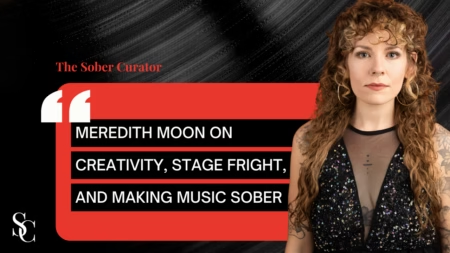Sobriety isn’t just about the moment you quit—it’s about what happens after. This is the ethos behind the Sober Curator Podcast, and it’s brought to life in Episode 21 by filmmaker and creator Aaron Strand. Host Alysse Bryson dives deep with Aaron, exploring the creative alchemy that transformed his struggles with addiction into an acclaimed feature film, Withdrawal. Their conversation peels back the curtain on creativity, ego, and growth, showing the power of staying open when recovery gets real—and messy.
Aaron’s story is both raw and inspiring. After hitting a low—homeless in New York City and returning to his small hometown of Athens, Georgia—he found himself pouring anger, resentment, and disappointment into notebooks just to survive another day sober. These weren’t polished prose or poetic reflections. They were messy, honest, and unfiltered. But a serendipitous Facebook conversation with a college friend changed everything; after reading Aaron’s vivid account of addiction’s internal chaos, she encouraged him: “This would be a great monologue.”
That bit of support planted a crucial seed. “It’s amazing what a little well-timed encouragement can do, especially when you’re in that super broken, vulnerable place just grasping for any kind of light,” Aaron reflects. With that validation, those venting sessions morphed into early scripts and a creative purpose that would evolve over a decade.
Building a Feature Film from Heartbreak—and Hope
Ten years—and many unfinished projects—later, Aaron reached a turning point. When a funded film fell through, he pivoted, channeling his experience into a contained, deeply personal story about a young couple preparing to quit heroin and try Suboxone for the first time. The result is Withdrawal: a love story wrapped in the gritty reality of recovery, told over a taut 36 hours.
“For every year, for 10 years, basically since I got sober, I said to myself, this is the year that I’m going to make a feature film,” Aaron recalls. “Every year I have fallen short… It’s hard to get those pieces together, especially for a first one.” Finally, all the elements clicked: the raw truth he’d captured in journals, a flexible indie approach, and the humility recovery had given him.
The production itself felt like another stage in recovery—pragmatic, community-supported, and focused on mutual respect. “I made a promise to every single person that I worked with… You’re going to be taken care of, treated with respect. You’re going to leave feeling like an artist. I can’t pay you what you’re worth, but I’ll make up for it with meaning.”
Art, Ego, and Emotional Hangovers
Film festivals and creative highs can be intoxicating, especially for those in early recovery. Aaron had tasted artistic success before, but only in sobriety did he learn to hold it with gratitude, not ego. “When I was younger, if to have those experiences, it was an immediate attachment to my ego. It was like, oh, I’m the shit, right? Which would then lead to these huge emotional fall offs.”
Now, he savors the accomplishment without the crash, grounded by gratitude and humility. The film’s sold-out Atlanta Film Festival screening was powerful, but Aaron notes the difference: “I was able to move through it with a degree of maybe grace and humility. I’ve never really experienced anything like it.”
Why Real Recovery Stories Matter—On Screen and Off
In a media landscape filled with polished, sanitized versions of addiction, Aaron’s commitment to honesty sets Withdrawal apart. Audiences connected with the film’s unflinching yet nuanced depiction of recovery; even the challenging scenes were met with respect (and, in one case, a few audience members literally running from the theater—an artist’s badge of honor in some circles).
But more than critical acclaim, it’s the moments when people approach him to share their own stories that affirm his mission. “There’s hardly a person alive in this country that has not been touched by this disease in one way, shape, or another,” he says. By being public and transparent, Aaron has created space for others to step out of the shadows.
Follow along with Aaron Strand in all of the digital spaces and places:
- IG @strandedonstage
- FILM IG @withdrawalfilm
- Withdrawal on Rotten Tomatoes (Sober Curator Pro Tip: This is where you can watch the trailer)
- Behind the Slate Podcast
- Crash Zoom Podcast
Listen to the Latest Episode Now

Getting sober is one thing—but staying sober? That’s where the real adventure begins.
This show is for you if you’ve ever wondered:
– Where can I find inspiring sober podcasts, apps, and creators?
– How do I give back or stay plugged into the sober community
– What are the best sober-friendly drinks and travel tips?
– Where do I find the good NA drinks that don’t taste like regret?
The Sober Curator is your go-to for sober pop culture, booze-free travel, apps, creators, and community.
We’re not here to help you get sober.
We’re here to help you live sober—and love it.
In this heartfelt episode of The Sober Curator, host Alysse Bryson is joined by a full lineup of Sober Curator contributors—Amy Liz Harrison, Alexandra Nyman, Megan Swan, Kim Parsley, and Dr. Sarah Michaud—to explore the life and legacy of Matthew Perry through a newly released documentary. The conversation delves into the documentary's focus on Perry's addiction battles, his recovery efforts, and his lasting impact. The episode also touches upon how Hollywood treats addiction and the role of documentaries in shaping these narratives.
Timestamps:
[00:00] – Introduction & Alysse Bryson's connection to Matthew Perry
[02:01] – Overview: Matthew Perry and the documentary
[03:16] – Key highlights of the documentary: addiction and recovery themes
[15:04] – The financial aspect of rehabilitation and its exploitation
[21:13] – Conversations about Big Pharma and harm reduction
[31:00] – Codependency within the circle of celebrities
[34:44] – The documentary's mixed narrative and impact on the community
[38:06] – Remembering Matthew Perry's legacy and the humor amidst tragedy
Resources & Links:
-Documentary: Matthew Perry: A Hollywood Tragedy
-Organization: Matthew Perry Foundation
-Review: ”Friends, Lovers, and the Big Terrible Thing” by Alysse Bryson
-Review: ”Friends, Lovers, and the Big Terrible Thing” by Amy Liz Harrison
–Alcohol + Substance Use Disorder Guide
–Recovery Nonprofit Resource Guide
–LBGTQ+ Recovery Resource Guide
Connect with Us:
-Website: www.thesobercurator.com
-Facebook: @The Sober Curator
-Instagram: @thesobercurator
-YouTube: @thesobercurator
-Pinterest: @thesobercurator
Follow & Subscribe:
If you enjoyed this episode, please consider leaving a review on Apple Podcasts or Spotify. Your feedback helps us improve and reach more listeners. Plus, the first 50 reviews on Apple Podcasts can win a sleek, limited edition Sober Curator fanny pack!
Send Feedback:
If you have a story, feedback, or just want to connect, email us at thesobercurator@gmail.com. We’d love to hear from you!
About:
Sobriety isn’t the end of the party—it’s just the start of a better one. Hosted by Alysse Bryson, media powerhouse and sobriety’s ultimate hype woman, and joined by Sober Curator contributors, The Sober Curator Podcast* delivers bold convos, pop culture deep dives, and zero-proof living that doesn’t suck. Whether you're sober, sober-curious, or just looking for good vibes without the hangover, we’ve got you covered. Subscribe now—because getting sober matters, staying sober matters more.
The intro and outro music for this episode is proudly featured with permission from Avatari. All rights reserved to the original creators. For more of their work, check out his website: https://www.avatariworld.com/music.
*The Sober Curator Podcast is a space for open and honest conversations about sobriety, recovery, and alcohol-free living. While we celebrate all paths to a sober lifestyle, some topics discussed may be sensitive or triggering for certain listeners. This podcast is for informational and entertainment purposes only and is not a substitute for professional advice. If you’re in recovery or exploring sobriety, please take care while listening and seek support from trusted professionals as needed.


Getting sober is one thing—but staying sober? That’s where the real adventure begins. The Sober Curator Podcast, hosted by Alysse Bryson and featuring the many voices of Sober Curator Contributors, proves that ditching booze doesn’t mean ditching fun, pop culture, or your social life.
Each episode serves up bold conversations, celeb interviews, zero-proof cocktail inspiration, and pop culture deep dives—all with laughs, honesty, and zero preachy vibes. Whether you’re sober or sober-curious, you’ll find insider tips, real-life stories, and endless reasons to love the alcohol-free life. Pull up a seat—this party’s just getting started!

MOVIE NIGHT WITH THE SOBER CURATOR: is your go-to guide for films and documentaries that intricately weave addiction, recovery, and mental health into powerful storytelling. Think of us as your bee-zy movie critics, curating a hive of must-watch titles that inspire, educate, and spark conversation.
Our review archives are neatly organized into Drama, Dramedy, and Documentary categories, making it easy to find your next captivating watch. Whether you’re in the mood for a heartfelt indie, a laugh-through-the-tears comedy, or a thought-provoking doc, we’ve got you covered.

Help is Available
THE SOBER CURATOR RESOURCE GUIDE: At The Sober Curator, we provide high-quality content centered around the vibrant and fulfilling lifestyle of sobriety. While our focus is on the positive aspects of sober living, we also acknowledge that life can present challenges without the aid of alcohol or substances. Coping with these challenges alone can be daunting, which is why we strongly believe in finding recovery within a supportive community because it is the opposite of addiction.
If you or someone you know is struggling with alcohol use disorder, substance use disorder, a co-occurring illness, or a behavioral health disorder, we urge you to seek help. While the task may seem daunting, it’s important to remember that support is readily available and that there are people out there who want to help.
It’s crucial to remain persistent in your search for assistance until you find the right solution for your unique situation. In some cases, it could be a matter of life or death, so it’s essential to never give up on finding the necessary help.
If your life or someone else’s is in imminent danger, please call 911. If you are in crisis and need immediate help, please call: 988.







